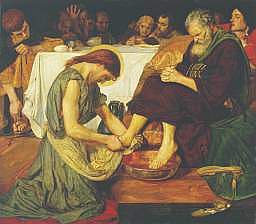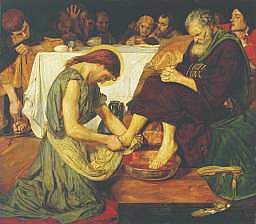 This is in response to a couple comments in my Love Feast post. Matt and Andrew both brought up footwashing. Originally, I was responding as a comment in that thread, but decided to turn this into a post.
This is in response to a couple comments in my Love Feast post. Matt and Andrew both brought up footwashing. Originally, I was responding as a comment in that thread, but decided to turn this into a post.
When I was younger—and most of the Jesus People stuff had not yet passed into history—I was really into footwashing. In fact, I had planned that I would wash the feet of the woman I planned to marry (no one in particular on the horizon at that time, though) as part of my proposal.
But then, for whatever reason, footwashing fell out of fashion with me.
Sometime last year I was reading a blog where the writer (who escapes me) said that the whole point of footwashing was that it served a practical purpose in the days of dusty roads and sandals. We don’t really walk dusty roads and the washing of a traveler’s feet is no longer a daily, hospitable act. The writer asked then to consider what today is a practical need that would serve in its place.
I’ve thought about that a lot and have come up with no single thing. We are a disconnected people, so I think that letter writing (real letters, not e-mail) or a phone call just to chat would work. Cutting a neighbor’s grass or washing and waxing her car are good ones, too. Offering to babysit a couple’s kids so they could go out for a date is thoughtful.
The spirit in which Jesus washed feet was to compel humility. It’s humbling to give a footwashing (and for some of us today to receive it.) In that same spirit, perhaps our practical substitution for footwashing today would be the action that spurs humility in us and blesses the receiver. I’m not sure that washing someone else’s car is humbling, but it at least reinforces the idea that we are servants. Most of the truly humbling acts that we have in our modern society have been farmed out into professions. I think there is nothing more humbling than being a hospice worker or in-home caregiver who deals with the aged who cannot perform even the simplest acts. Maybe the man or woman who works with the profoundly retarded, brain damaged, or AIDS patients in the beginning throes of decline is today’s designated footwasher.
All I can say is that the servant is not above the Master. We are called to service and yet daily opportunities for service elude us, either because we have have so distanced ourselves from others or because we have forgotten how to recognize an opportunity to serve.
A prayer:
Lord Jesus, open our eyes to the practical needs of the people we encounter daily. Give us servant hearts that can lay down our own lives and address the simple needs of others, no matter how much humility is needed to meet them. In a day where pride reigns, let us be those who are not so proud that we ignore others in their time of need or think that someone else will be up to the task we neglect. Let us reflect your love in a way grasped by both the lost and the brother in dire need. Amen.


 I don't usually blog about my emotional well-being, but it's been a rough week. Monday I got bad news about a serious dental problem I have that can only be resolved by drastic, painful surgery to the tune of a year's tuition (or more) at Harvard. With both of us deflated by this news, my wife asked me what people with my condition did before this kind of surgery was available. The only answer? They lived with it.
I don't usually blog about my emotional well-being, but it's been a rough week. Monday I got bad news about a serious dental problem I have that can only be resolved by drastic, painful surgery to the tune of a year's tuition (or more) at Harvard. With both of us deflated by this news, my wife asked me what people with my condition did before this kind of surgery was available. The only answer? They lived with it.